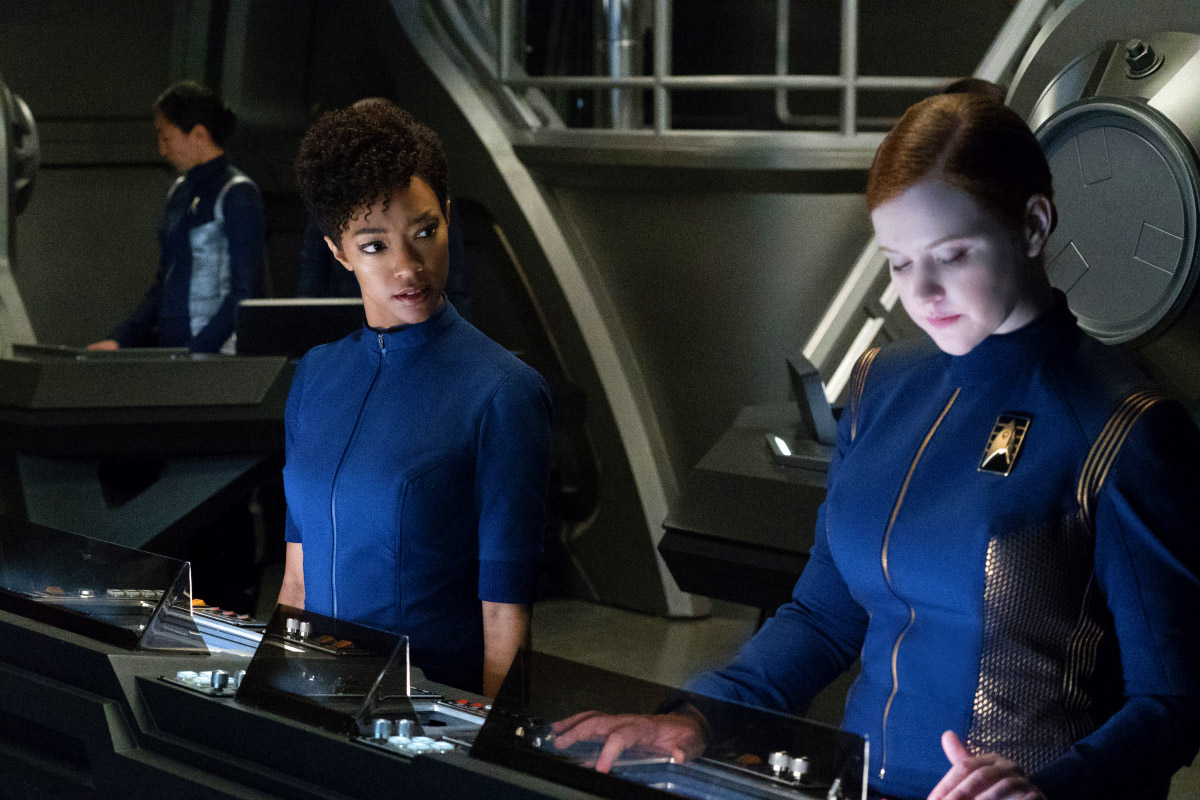'Star Trek: Discovery': Voyage into the F-Bomb Frontier Follows a History of TV Cursing

While the f-bomb in "Star Trek: Discovery' this week was not the first time Trekkies heard swearing in the Final Frontier, fans were still shocked by the series' first appearance of the f-word.
Two characters dropped the word after a scientific breakthrough on the show regarding the "spore drive," an engine that allows the USS Discovery to move nearly instantly from place to place in the universe. The brief scene caused a sensation on social media and several "Star Trek"-themed websites.
Anthony Rapp, who plays Lt. Paul Stamets, was one of the two people to use the f-bomb in the latest episode.
"We were aware of it, and we embraced it, and we had a blast with it," Rapp told Liz Shannon Miller in an interview with Indiewire. [15 of the Most Bizarre Alien Species Featured in Star Trek]
"These people just put their brains to work in a really tough way, and they had a breakthrough," Rapp said. "And I imagine there's scientists in their labs who might do that anytime. We didn't drop the f-bomb in 'Star Trek' by telling something to go f--- themselves. It's like we did it by saying, 'This is f---ing cool.'"
Fans pointed out that "Discovery" probably had more liberty with the f-bomb because it is broadcast on the CBS All Access streaming service, so it is isolated from network TV's usual rules about profanity. (Generally, unless profanity occurs on a late-night show, it is bleeped out on network television.)
But "Star Trek" fans should remember that profanity has been with the show since the beginning, even in the kid-friendly original series (TOS), which ran between 1966 and 1969. (In the 1960s, there was very little profanity on television compared with today.)
Get the Space.com Newsletter
Breaking space news, the latest updates on rocket launches, skywatching events and more!
The first profanity on "Star Trek" came with the 1967 episode "The City on the Edge of Forever," in which Capt. James T. Kirk (played by William Shatner) says, "Let's get the hell out of here." The fiery Kirk swore again later that year (in "The Doomsday Machine") while the Enterprise was approaching a fight, saying, "[What] the hell's going on?"
The Starfleet swearing tradition carried on when "Star Trek" hit the silver screen. Fans probably best remember Spock's confusion about swearing (or, as Spock called it, "colorful metaphors") in contemporary Los Angeles during "Star Trek IV: The Voyage Home" (1986). But there are many other examples, such as during "Star Trek II: The Wrath of Khan" (1982). Dr. Leonard McCoy (DeForrest Kelley) declares, "Damn it, Jim — what the hell's the matter with you? Other people have birthdays. Why are we treating yours like a funeral?" [Where No Films Have Gone Before: The Complete 'Star Trek' Movie List]
TOS-era characters were rebooted for Hollywood in 2009, appearing in three movies so far. And there has been plenty of swearing in them. In 2009's "Star Trek," the young Kirk (Chris Pine) once called "bulls---" on Spock Prime (Leonard Nimoy). And the ever-sarcastic Dr. Leonard McCoy in the rebooted series (Karl Urban) loves spouting lines such as "Damn it, man; I'm a doctor, not a torpedo technician!"
And lest you think other "Star Trek" television shows were immune to swearing, Danette Chavez at the A.V. Club reminds us that the theatrical Capt. Jean-Luc Picard (Patrick Stewart) wasn't adverse to the occasional curse word. "But, like the sexy, shiny-pated polyglot he was, he always did it in a language other than English," according to the article.
By the way, NASA has grappled with the problem of swearing from real-life astronauts. Perhaps the most famous example took place during Apollo 10 in 1969, when lunar module pilot Gene Cernan and Cmdr. Tom Stafford were doing a simulated lunar landing. The lunar module temporarily experienced a malfunction that caused it to spin, causing Cernan to exclaim on a live broadcast, "Son of a b----! What the hell happened?!"
"Star Trek: Discovery" episodes air Sundays at 8:30 p.m. ET on the CBS All Access subscription streaming service.
Follow us @Spacedotcom, Facebook and Google+. Original article on& Space.com.
Join our Space Forums to keep talking space on the latest missions, night sky and more! And if you have a news tip, correction or comment, let us know at: community@space.com.

Elizabeth Howell (she/her), Ph.D., was a staff writer in the spaceflight channel between 2022 and 2024 specializing in Canadian space news. She was contributing writer for Space.com for 10 years from 2012 to 2024. Elizabeth's reporting includes multiple exclusives with the White House, leading world coverage about a lost-and-found space tomato on the International Space Station, witnessing five human spaceflight launches on two continents, flying parabolic, working inside a spacesuit, and participating in a simulated Mars mission. Her latest book, "Why Am I Taller?" (ECW Press, 2022) is co-written with astronaut Dave Williams.









